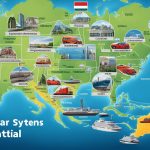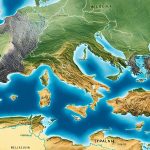We set out to explore the economic and living standards in three unique European countries. Each nation has its own charm and challenges. The Czech Republic is known for its history and strong economy. Portugal offers beautiful coasts but faces economic hurdles. Italy is celebrated for its culture but grapples with financial issues.
We look at the cost of living and economic situations in these places. These affect how people live and find happiness. This comparison is not just interesting, but also useful for those thinking of moving to these countries.
Historical Context and Impact on Current Economies
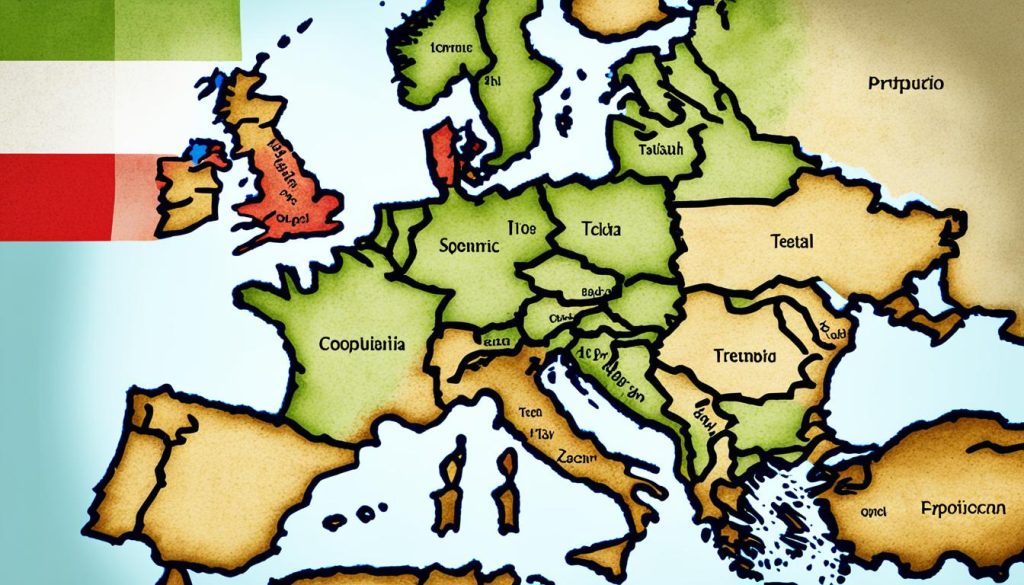
Exploring the history of the Czech Republic, Portugal, and Italy reveals vital insights. These insights shape their economic conditions and quality of life. Their past choices and events have deeply influenced their economic paths and their current situation in the European Union.
The Evolution of Czech Republic’s Economy from Czechoslovakia to EU Member
The Czech Republic transformed greatly after it parted ways with Slovakia. It moved from a communist economy to a market-driven one. By opening up its market and encouraging foreign investment, the country saw growth and an improved lifestyle. Joining the EU further boosted its economy, linking its market with other European countries.
Portugal’s Economic Growth and Challenges Post-Dictatorship
Portugal bounced back after years under a dictatorship. The nation pushed for modernisation and experienced both growth and setbacks. Financial crises hit, but EU support helped in its recovery. This shows Portugal’s resilience and how EU ties have strengthened its economy.
Italy’s Economic Developments and Influence of Historical Events
Italy’s history has played a significant role in shaping its economy. Its story is rich with trade, industry, and political changes. As an EU founding member, Italy has adjusted to and influenced European economic changes. Its history underpins its modern economic role within the EU.
Geographical and Population Comparisons
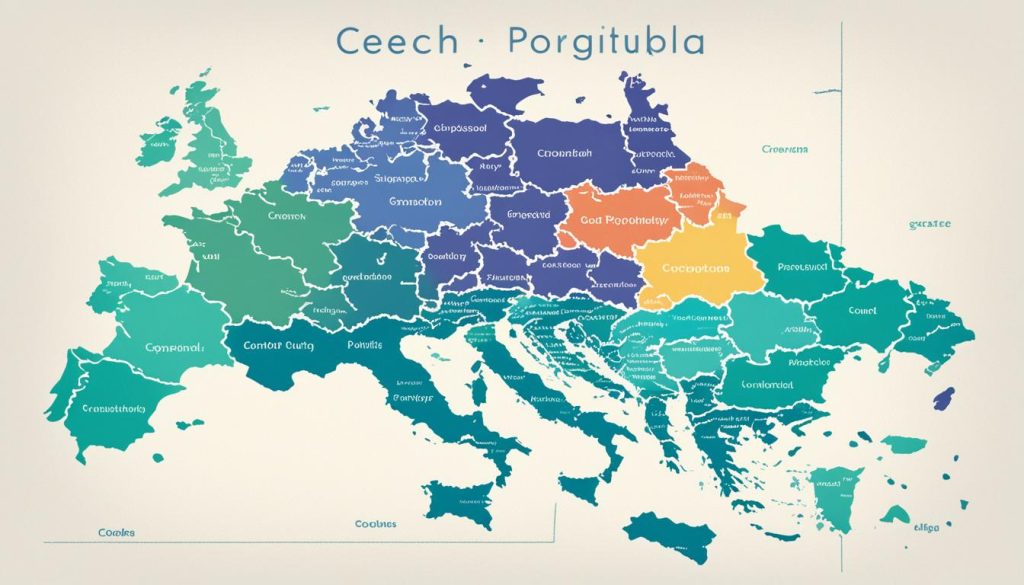
The Czech Republic, Portugal, and Italy show how diverse Europe is. We look at their land sizes and population numbers. This helps us understand their economy and how people live there.
- The Czech Republic may not be big, but it has a lot of people. Its location in central Europe is important for culture and business.
- Portugal, by the Atlantic, has a unique geography. Its population and economy benefit from this.
- Italy’s shape and islands hold deep historical and cultural stories. It has a large area and many people.
Knowing about these countries’ land and people is key. They shape the economy and how people interact in the Czech Republic, Portugal, and Italy.
Looking at geography and population gives us insights. It helps us understand the Czech Republic, Portugal, and Italy better. With these basics, we can dive deeper into their economies.
Overall Economic Indicators: A Comprehensive Overview
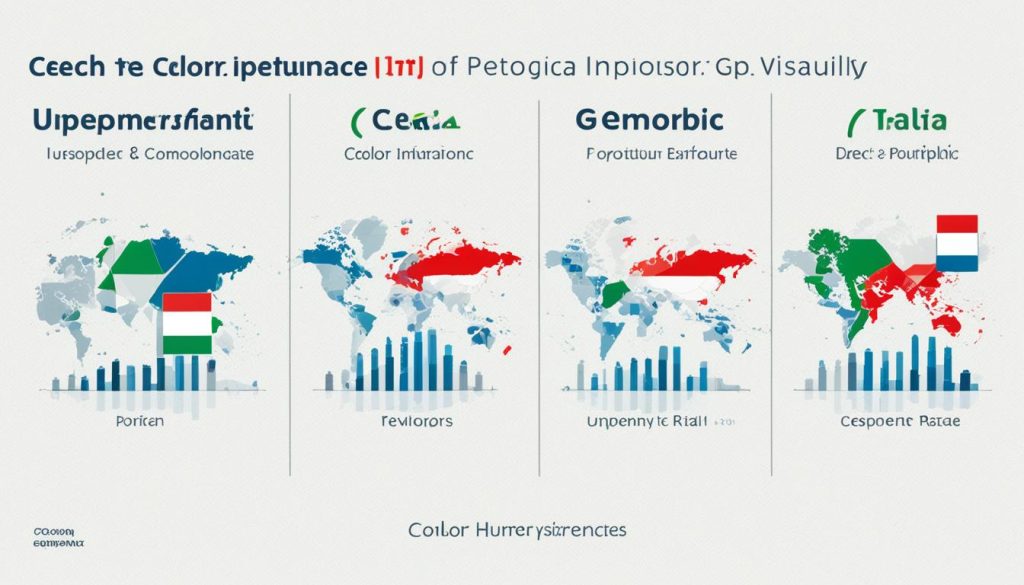
When we look at a country’s economy, we need to check different factors. We focus on three main indicators – Gross Domestic Product (GDP), unemployment rates, and inflation rates. They help us understand the financial health of the Czech Republic, Portugal, and Italy.
Gross Domestic Product (GDP) Comparisons
GDP is like the backbone of an economy. It shows the value of all goods and services produced. Looking at the GDP of the Czech Republic, Portugal, and Italy tells us about their economic performance and growth.
Unemployment Rates Across Czech Republic, Portugal and Italy
Unemployment rates tell us a lot about a country’s economy. They show how many people are looking for jobs. This affects how much money people spend and the overall economic confidence. By comparing these rates, we learn about the job markets in the Czech Republic, Portugal, and Italy.
Inflation Rates: Stability and Fluctuations
Inflation rates are key to understanding the stability of prices. They impact how much your money is worth and the cost of living. Seeing how inflation differs in the Czech Republic, Portugal, and Italy helps us see how it affects people’s lives and the countries’ economies.
The Cost of Living Index Breakdown
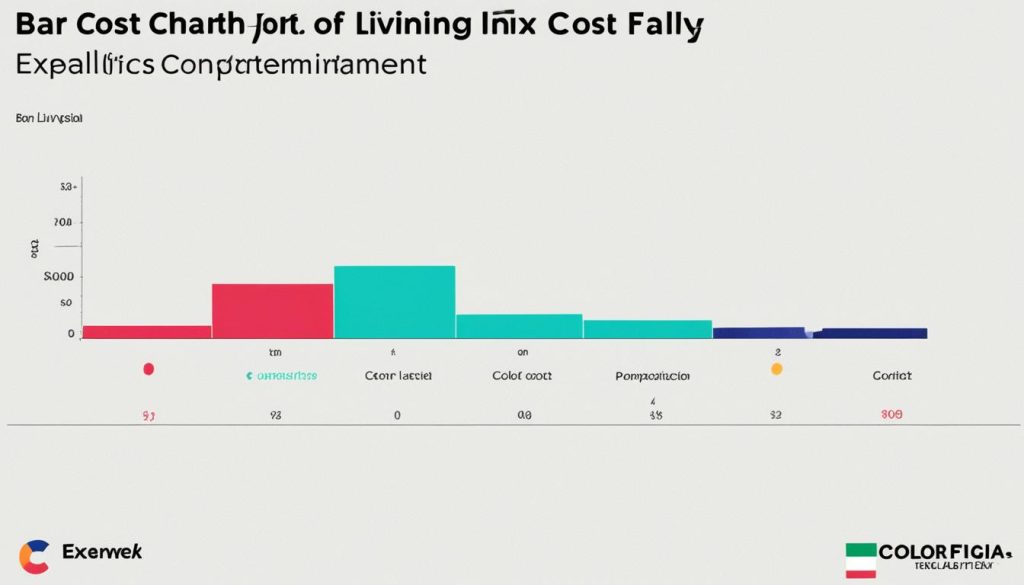
Exploring the Cost of Living Index is crucial. It reveals economic details that affect daily life in the Czech Republic, Portugal, and Italy. This tool compares costs to show the financial demands in each country. It helps those thinking about moving or investing in Europe.
Each category of the Index sheds light on different daily costs:
- Housing: Evaluates the cost of buying or renting a home, including utilities.
- Groceries: Compares prices of food items and essentials across supermarket chains.
- Dining Out: Looks at the average cost of a meal at an inexpensive restaurant to finer dining experiences.
- Transportation: Considers public transport fares, fuel prices, and the costs of buying and maintaining a vehicle.
- Healthcare: Discusses medical expenses, from doctor’s appointments to hospital services and pharmaceuticals.
- Clothing: Reviews prices of apparel and footwear across a variety of retail outlets.
Breaking down the Cost of Living Index clarifies how living standards vary. It shows the financial pressures in each place. Examining expenses lets us see how euros work in each economy, influencing people’s choices and life quality. This Index is key for understanding purchasing power in the Czech Republic, Portugal, and Italy. It helps people and businesses make smart choices.
Housing and Real Estate: Affordability and Market Trends

In the Czech Republic, Portugal, and Italy, finding a comfortable home is linked with market trends and affordability. The cost of owning property and the living standards are key in these countries. Let’s look at how these factors affect the housing market, focusing on renting and buying a home.
Rent Index Comparison between Countries
When we compare rent indexes in the Czech Republic, Portugal, and Italy, we learn about living costs. Housing affordability affects how much people can spend. These indexes show us economic trends and how they might change for renters.
Property Ownership: Costs and Possibilities
Owning a home ranges from affordable to high-end investments. It represents stability and is a significant achievement. However, market trends and economies affect this goal. Do Prague or the Italian countryside offer better chances for owning a home? Market data and trends give us insights.
Housing Quality and Livability Factors
Quality housing and livability show what life could be like. The design of buildings and infrastructure play a huge role in affordability. But what does it feel like to make a place ‘home’ in these countries?
Educational Systems and Access to Education

When looking at education in countries like the Czech Republic, Portugal, and Italy, we see big differences. These differences affect schooling, student experiences, and higher education paths. They also shape chances for better jobs and growth.
In the Czech Republic, schooling is strict and mandatory till age 15, with high academic standards. Education is mostly free, giving all students a fair chance to succeed. Czech universities are well-known globally, particularly in science fields.
Portugal has been working hard to improve its education system. It aims to increase literacy and keep more students in school. Education is compulsory till the 12th year. There are many scholarships and community programs that help students from all backgrounds.
Italy is famous for its historic universities and focus on arts. Its education system offers both public and private options, with public ones being free. This inclusion helps everyone. Italian universities also have strong links to industries and research, opening up many job opportunities for graduates.
- The Czech Republic’s education system is centralised with a focus on equal opportunity.
- Portugal is expanding educational access through reforms and community investment.
- Italy combines tradition with a growing emphasis on research and industry collaboration.
Understanding how education systems in these countries work also tells us about the access students have. It shows us what each society values. Education is key to a better life and job prospects. That’s why its growth and how we look at it matter so much, both locally and around the world.
Comparing Healthcare Services and Quality
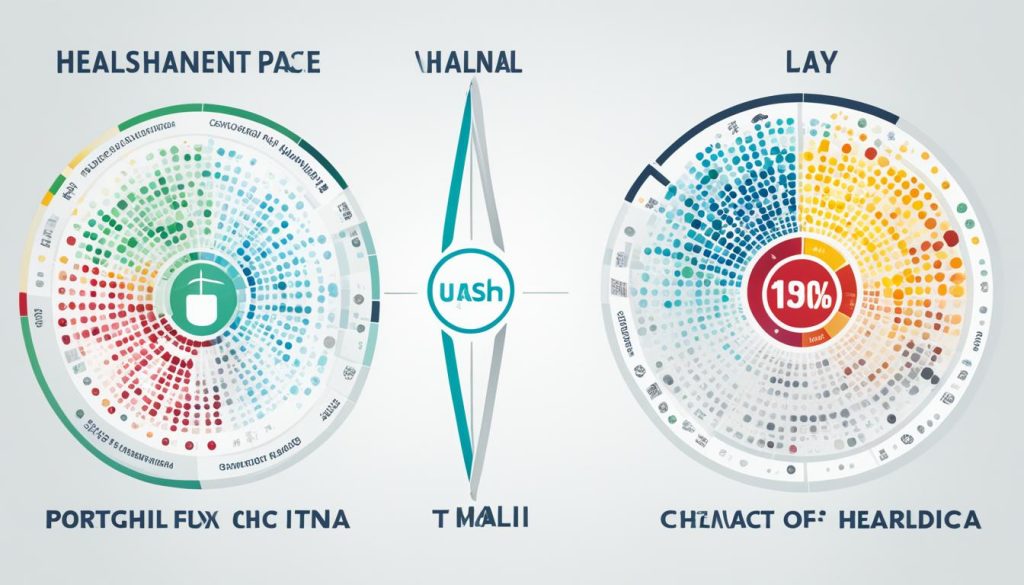
The quality of living in any country is closely linked to its healthcare services. It includes the standards of healthcare, quality of patient care, and money spent on healthcare. This analysis looks into the Czech Republic, Portugal, and Italy’s healthcare approaches. We will see how they impact their citizens’ well-being.
Healthcare Infrastructure and Expenditure
Spending on healthcare infrastructure is crucial. It ensures services meet people’s needs. Each country uses part of its GDP for healthcare, aiming to create strong systems for top-notch care. We’ll explore how these investments lead to better healthcare facilities. And how they help in offering essential services effectively.
Access to Medical Care and Patient Satisfaction
Getting to medical care easily is essential for quality patient care. It’s not just about having services but how easy it is to access them. This affects how happy patients are. We’ll look into how easy it is to get healthcare. This includes wait times, location of facilities, and availability of healthcare workers. Plus, we’ll see what people think of the care they get in these countries.
- Examination of healthcare accessibility parameters across the Czech Republic, Portugal, and Italy.
- Analysis of factors contributing to patient satisfaction and their experiences with healthcare services.
- Overview of how healthcare expenditures impact the overall patient care quality in the respective nations.
Knowing the strong points and what needs to be better helps us see. It shows how healthcare services, patient care quality, and money spent come together. They play a big part in a country’s health and happiness levels.
Career Opportunities and Average Income

An exploration into the economic landscape of the Czech Republic, Portugal, and Italy shows key insights. We’re looking at career prospects, job market trends, and income disparities. Understanding these helps us grasp the challenges and opportunities in these countries’ job markets.
Job Market Trends
The job markets in these countries are affected by technology, global shifts, and demographic changes. For job seekers or those thinking of moving for work, it’s crucial to watch these trends.
- Emerging sectors and the demand for skills in areas like information technology and renewable energy.
- The impact of globalisation on local job markets and the thrust towards a more interconnected workforce.
- Transitioning economies and how traditional industries are adapting or diminishing in the modern age.
Sector-Specific Opportunities and Challenges
Looking closer, we see clear differences in sector-specific growth and challenges. Knowing these details helps identify where the career prospects are most promising.
- Analysis of growth sectors within each country and the expertise required to thrive within them.
- Local economic policies and their influence on sector-specific development.
- Challenges such as regulatory environments, competition, and economic sustainability impacting sector viability.
Income Levels and Distribution Disparities
Income tells us about societal values and economic structures. Seeing income levels and disparities offers insight into broader income disparities in these countries’ workforces.
- Comparative analysis of average incomes and the factors leading to wage differences.
- The extent of income inequality and efforts being made to bridge these gaps.
- The interplay between education, skill sets, and earning potential in each nation.
As jobs change, it’s vital to stay informed on these aspects. This is key for anyone starting or continuing their career in the Czech Republic, Portugal, or Italy.
Quality of Life Indicators: Beyond the Economics
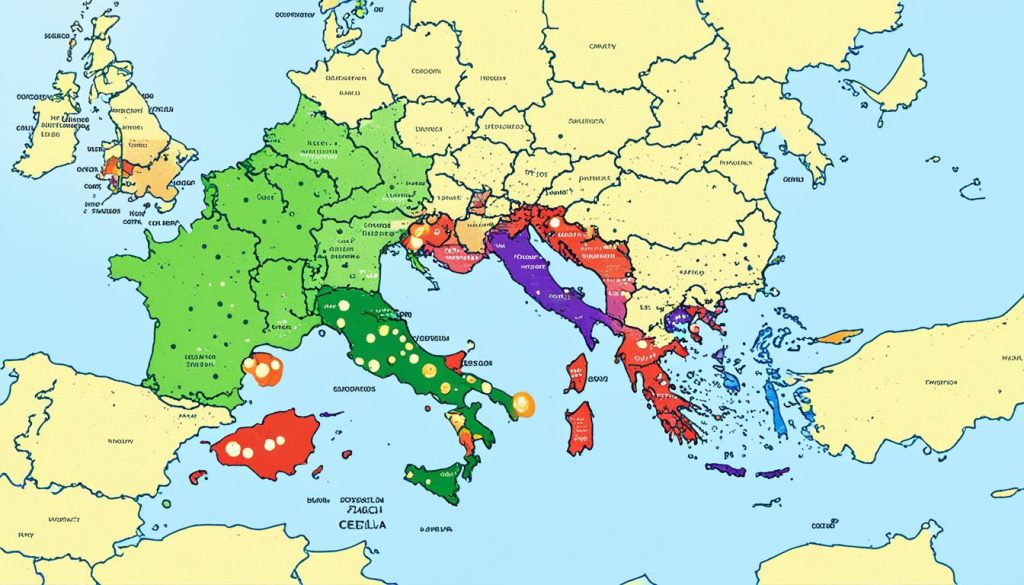
Looking only at money doesn’t show us what it truly means to live well. By considering happiness, environment, and safety, we get a fuller picture. These things tell us what daily life is really like for people in the Czech Republic, Portugal, and Italy.
- Life satisfaction is about how happy people are with their lives. In places like the Czech Republic, Portugal, and Italy, culture, work-life balance, and community are key to happiness.
- Environmental quality is also vital. It affects our health and how we feel. Clean air, parks, and managing waste well are signs of a good life in these countries.
- Social security provides a safety net for people at different times in their life. It’s essential for living a life of dignity and security.
This combination creates societies where people do more than just get by. As we look into these indicators, we understand the rich and varied living standards in the Czech Republic, Portugal, and Italy.
Work-Life Balance: Assessing Time for Leisure and Personal Life
Finding the right balance between work and life is key to wellbeing. Vacation policies and work hours highlight what countries value in personal time and culture. By looking at the Czech Republic, Portugal, and Italy, we see how Europeans strive to mix work with leisure.
Vacation Policies and Average Hours Worked
The Czech Republic offers a lot of leisure time, thanks to its vacation policy. Italy also values breaks, aiming to refresh its workers. Portugal’s mix of holidays and paid leave shows they consider vacation essential for a happy life.
In Italy, people work hours that fit global norms while enjoying life. Portugal has a similar workweek, valuing rest. The Czech Republic’s work hours allow for enjoying cultural activities after work.
Cultural Activities and Personal Development Opportunities
Cultural experiences enrich work-life balance. Italy, with its history, offers many leisure opportunities, like visiting art galleries. Portugal’s traditions and festivals add to a full life. The Czech Republic, known for its arts scene, provides chances for personal growth through culture.
A person’s growth during free time shows how well a country supports work-life balance. The Czech Republic, Portugal, and Italy show their commitment to balancing work with cultural life.
Food, Cuisine, and Living Culture: A Taste of Lifestyle
Exploring the rich culinary traditions and typical cuisine of a region sheds light on its lifestyle cultures. Food is key to survival. It also plays a big role in how a society celebrates, showing the heart of each nation. This section takes us into the kitchens of the Czech Republic, Portugal, and Italy. We’ll see how their food traditions reflect their daily life and communal spirit.
In the Czech Republic, a big meal ends the day. The dishes are hearty and tasty. They show the Czech connection to the land through their love for meat and bread dumplings or potato pancakes.
- Traditional Czech Roast Pork with sauerkraut and dumplings
- Hearty beef stew named Svíčková, with a creamy sauce
Portugal’s cooking tells a tale of sea explorers and fishermen. Bacalhau is their star dish. This dried and salted codfish is made in many ways, showing off the cleverness of Portuguese food.
- Bacalhau à Brás, made with cod, onions, potatoes, and eggs
- Caldo Verde, a kale soup from the north
Italian food is famous worldwide. It ranges from simple dishes like pizza Margherita to complex regional recipes. The Italian evening stroll often ends with a great meal. This highlights how important food is in Italy’s culture.
- Classic Ragù alla Bolognese, showcasing northern Italy’s rich food
- Caprese Salad, with the fresh tastes of the sea
Delving into the cuisines of the Czech Republic, Portugal, and Italy opens up new views on life. Each country’s food tells a story. From the hearty Czech meals to Portugal’s sea-inspired dishes, and Italy’s love of dining. These culinary journeys reveal the true essence behind their lifestyle cultures.
Expat Experiences: Relocation and Integration Challenges
Moving abroad is both exciting and tough. Expats in the Czech Republic, Portugal, or Italy face different challenges. Learning new languages and understanding cultures are big hurdles. It’s very important to tackle these challenges to thrive in a new country.
Language Barriers and Community Engagement
One major issue for expats is the language barrier. This can make it hard to fit into the community. In the Czech Republic, the language is not widely spoken. So, learning it is key for making friends. Italy and Portugal may be easier, but dialects can still make things tricky.
- Understanding of local laws and social norms
- Participation in local events and cultural activities
- Building personal and professional networks
Residency Permits and Legal Requirements
Getting legal residency can be complex. Each country has its own rules and processing times. Portugal has the Golden Visa program for investors. But Italy and the Czech Republic have tougher rules. Knowing these procedures is crucial.
- Navigating visa applications and renewals
- Compliance with local immigration laws
- Securing employment or proof of financial stability
Adjusting as an expat requires effort and patience. But, it leads to personal growth and new perspectives. Embracing life in a new country brings great rewards.
Conclusion
Looking at the economic scene, living standards, and the idea of moving countries requires deep analysis. We looked at the Czech Republic, Portugal, and Italy to understand how each country differs. These studies help those thinking of moving abroad make wise choices by considering many important factors.
Moving countries is a big step that brings excitement and nerves. With so many things to consider, moving abroad is a big decision. It needs careful thinking and a lot of information.
Here are the key points from our study:
- Economic Indicators: Checking the GDP, job rates, and inflation gives us clues about a country’s financial health.
- Cost of Living: Looking at prices helps us understand how affordable different things are in each place.
- Housing Markets: Understanding housing trends helps gauge how happy you might be living there.
- Access to Education and Healthcare: Good schools and healthcare impact how long and well you live.
- Work-Life Balance: Looking at how much free time people have tells us about their happiness.
Our detailed comparison helps those looking to move. We show differences in lifestyle in the Czech Republic, Portugal, and Italy. This guide is designed to help future residents form a clear picture of what to expect. It aims to make the decision-making process easier, giving people the info they need for a well-thought-out move.
[Reserved for potential future updates or content expansion]
This section is set up for the unavoidable changes and new trends in our world. It aims to keep our analysis useful for readers following international changes. By adding new insights, we’ll keep up with economic and living standards changes in the Czech Republic, Portugal, and Italy.
We’re excited to update this discussion with new information and insights. This section will capture important changes in policies, economies, and cultures. These changes greatly affect people’s lives. We’ll include expert opinions and firsthand reports to give a complete view of these shifts.
Looking ahead, we know economic health and life quality constantly change, influenced by global trends and new technologies. Our updates will cover both the facts and how people feel about these changes. We aim to be a dependable source for those living in or interested in these countries.



